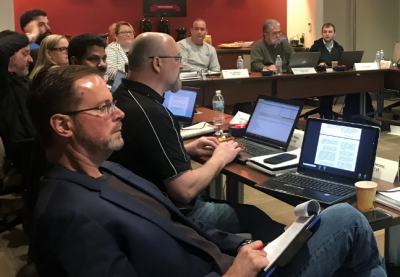Here’s What Goes Into the Development of NADCA Certification Exams
For our NADCA members—and really any business out there—developing your personnel is one of the best investments you can make. When you do it right, your business will be set for success for years to come.
At NADCA, we work hard at keeping our training and certification exams relevant for the evolving HVAC industry. One perk of NADCA membership is significant discounts on industry training and certification exams including Air Systems Cleaning Specialist (ASCS) Certification and Certified Ventilation Inspector (CVI) Certification. ASCS certification is a world-wide credential that recognizes knowledge and skills related to HVAC system hygiene, while CVI certification is an advanced certification that recognizes industry professionals who are highly skilled in HVAC system inspection. Certification not only serves to enhance the professional development of your HVAC technicians — having ASCS- and CVI-certified techs helps your business stand apart from your competitors.
While we don’t have to tell you all about the importance and benefits of certification, what you might not know is just what all goes into the development of NADCA’s ASCS and CVI certification exams.
To ensure NADCA’s certification exams meet best practice standards (and are legally sound), we follow a rigorous process that includes working with a panel of subject matter experts, as well as a psychometric firm. Some of the steps of this meticulous process include conducting a job/task analysis (JTA), developing an exam blueprint, writing and reviewing questions, developing and reviewing an initial exam form, conducting a pilot of the new exam, and establishing a passing score.
Conducting a Job/Task Analysis (JTA):
A JTA is the process that industry subject matter experts follow to identify the knowledge, skills, and abilities necessary for an ASCS- or CVI-certified individual. This intense analysis essentially becomes the foundation of the exam, and helps shape the content that will be included on the exam.
Developing an Examination Blueprint:
The exam blueprint is fundamentally rooted in the JTA, and provides an outline of various content areas that should be included in the exam. The blueprint also helps determine how many questions should be developed for each area of content.
 Writing and Reviewing Questions (Items):
Writing and Reviewing Questions (Items):
The process of writing the exam questions is truly where the rubber meets the road. Subject matter experts from the industry are trained on best practices for writing items, as well as general instructions about what to do and what not to do. These experts work hunker down for an intensive three-day workshop to write, vet, and approve questions for the exams. A professional psychometrician facilitates the workshop to help ensure that items are clear and concise.
Assembling and Reviewing Initial Exam Form:
Once the questions are written, the psychometric firm assists in assembling the exam test form.
The form is also reviewed by the subject matter experts. This review looks for any content imbalances, as well as grammatical or spelling errors.
Conducting a Pilot of the New Exam Form and Establishing a Passing Score:
Once the new test form is ready, it is debuted at a NADCA event, where another development process that incorporates the candidate data is executed to determine an appropriate passing score requirement for the exam. This process ensures that the passing score that’s set is based on psychometric data, and is both reasonable and appropriate for the level of difficulty of the exam itself. It should reflect what a minimally competent candidate should realistically achieve.
Without a doubt, the process NADCA uses to develop certification exams is extremely thorough and professional, always encompassing best practices of exam composition. We’ll continue to work hard on exam development to ensure all of our training and certifications help our members move their business forward.
Click here to learn more about NADCA’s Air Systems Cleaning Specialist (ASCS) and Certified Ventilation Inspector (CVI) certifications.
